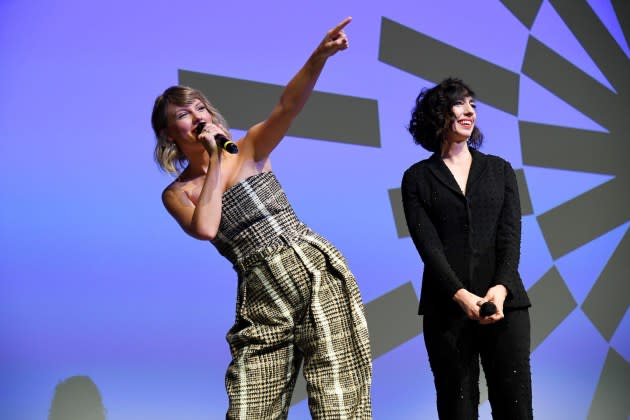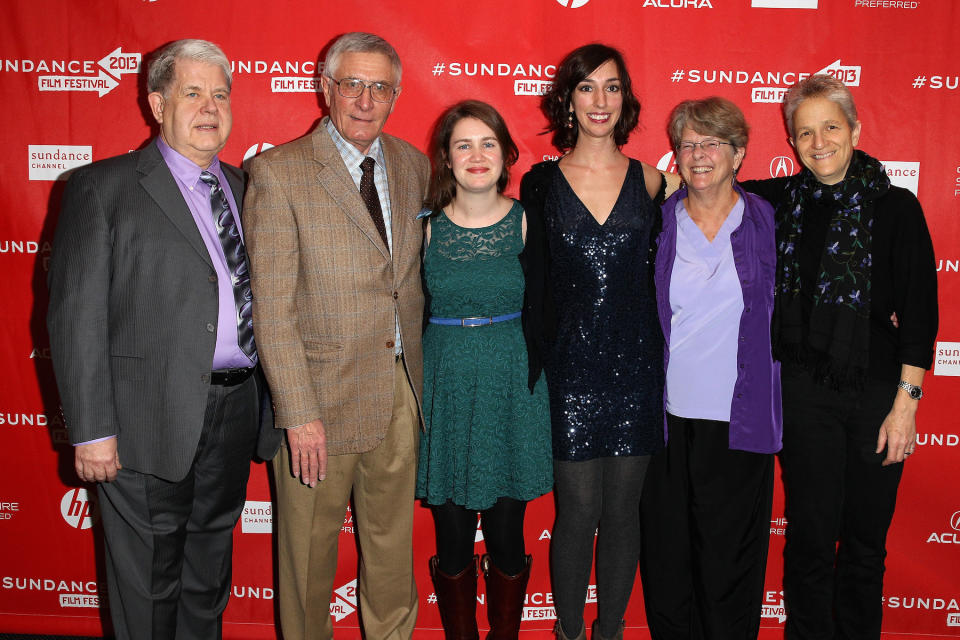Taylor Swift’s Documentarian Explores the Strange World of Psychics
- Oops!Something went wrong.Please try again later.
- Oops!Something went wrong.Please try again later.
- Oops!Something went wrong.Please try again later.

Lana Wilson was in her mid-twenties and working for a non-profit in New York City when she learned that George Tiller, the medical director of one of the only clinics in the U.S. that provided third trimester abortions, had been assassinated by an anti-abortion terrorist.
“I was so horrified and so disturbed by the news — and how the media was covering it,” she recalls to Rolling Stone.
More from Rolling Stone
'As We Speak' Exposes the Racism Behind Criminalizing Rap Lyrics
Kodak Black Demands Drug Case Dismissal After Lab Tests Prove No Cocaine
She’d been “too cowardly” (her words) to make a film up to that point but couldn’t stop thinking about one that followed the four remaining doctors in America who provided third trimester abortions in the wake of Tiller’s murder. With the help of her pal, Martha Shane, Wilson co-directed After Tiller, which debuted to raves at the 2013 Sundance Film Festival and won an Emmy.
As it happens, a little singer-songwriter by the name of Taylor Swift was so impressed by Wilson’s sensitive handling of a complex subject in After Tiller that she personally selected her to direct her Netflix documentary Miss Americana, the opening-night film of Sundance 2020. And last year, Wilson’s two-part documentary Pretty Baby: Brooke Shields, chronicling Hollywood’s sexual exploitation of the actress from an early age, became one of the fest’s most talked-out films.
Now, Wilson is back at Sundance with Look Into My Eyes, a documentary that follows seven New York City psychics — all of whom harbor performing-arts ambitions — as they help their clients navigate trauma during the Covid pandemic.
“You saw a lot of people struggling with loneliness and loss, but there were also people being there for each other more than ever,” Wilson says.
The acclaimed filmmaker sat down with Rolling Stone at Sundance to discuss her latest, how she became Taylor Swift’s documentarian, and the next phase of her career.
How did you find these psychics and what compelled you to make a film about them?
I’ve been in New York almost twenty years, but I was actually filming in Atlantic City the night of the election in 2016. It was a bad night for me, personally, and a lot of people. Trump has multiple bankrupt casinos there, and I thought it would be these ironic portraits of the bankrupt Taj Mahal. But as the night went on, it was like living in a horror movie. In the morning, I was waiting for my ride to go back to the city and feeling all those feelings and I saw a sign that said, “$5 Psychic Reading.” I had never been to a psychic before, but I walked in, pulled back this curtain, sat down at the table, and was immediately overcome with emotion. I felt like I was looking into a mirror at my own desperate state at that moment. It was very powerful — and nobody was even there.

Then, the psychic came in, gave me a five-minute reading, and she was very comforting and soothing. She asked me what I did, and I told her I was a filmmaker who was finishing this documentary [The Departure] about a punk rocker turned Zen Buddhist who inspired suicidal people to keep living. She said, “That sounds like my life. People come in here considering suicide and come in here at all kinds of crossroads in their lives.” A lightbulb went off and I thought, “It could be amazing to have a film inside these sessions getting to see this swath of humanity coming through these doors.”
The thing that struck me watching Look Into My Eyes is that the customers and psychics are there for similar reasons. Not only are the customers grappling with trauma, but the psychics are also haunted by major losses in their lives.
That was a big revelation I had, too. I’d lived in New York the whole pandemic and thought, “Maybe it’s time to make my psychics film.” I thought it would be storefront psychics, and I’d go in and do readings with people, and the storefront psychics I found to be really dry, like, “You will live a long life,” “You will leave New York City.” Me and my producer, Kyle Martin, got readings all over the city — maybe 150 readings in total — and I found myself gravitating toward psychics who operated more at the intersection of psychotherapy and had longer, deeper sessions. Those aren’t about predictions, but more about the emotional experience they’re having.
There’s a great moment in the film where you’re talking to one of the psychics and ask them how what they do is different from theater improv, and she’s like, “Well…”
Yeah. And I love when I asked, “How do you know this is not just your imagination?” And she says, “I don’t. But I don’t think it matters because if it resonates with the person you’re talking to, that’s what matters.” I can’t speak to the psychics’ accuracy, but I can speak to how good they felt afterward. And I would say that 95% of the clients who came in felt really good afterward. And that was one of my big takeaways from this: I don’t think it matters so much if you believe what the psychics are saying or not. It’s more of this vehicle for you to understand and process your life and your losses. We found the clients by setting up tables all over the city that read, “FREE PSYCHIC READINGS,” and we’d say, “Are you OK with being filmed for a documentary?” Then, if they were, we would Zoom with them once and explain the project to them.

Roe v. Wade has of course been repealed since you made After Tiller, your documentary about the last four doctors in America who perform third-trimester abortions.
Its repeal has, of course, had a horrific impact on the lives of so many people. It’s absolutely awful.
We last spoke for After Tiller, which was here at Sundance in 2013. And I was also at the premiere of Miss Americana here. When you were introducing Miss Americana at the premiere, you said that Taylor Swift hired you because she was a fan of After Tiller, which I found pretty surprising.
It was kind of out of nowhere that I got a call from Netflix saying, “Would you be interested in making a documentary about Taylor Swift,” and I was like, “What? Of course.” And they asked me if I wanted to meet her soon and said, “She’s watched your films.” I think they sent her a list of names of potential directors and she checked out everyone on the list and watched their films.
I went to meet her in person for the first time and she really had watched. We talked about After Tiller and she said she’d responded to how emotionally powerful it was and that it was very complex and intimate, but it didn’t shy away from the gray area. She’s someone who had been — and still is — judged on this global scale, and especially at the time when I met her, people saw her in this black and white way. They either loved her or hated her, and I don’t think people were seeing her as the complex human being that she is. That’s what she responded to most about After Tiller.
You’re maybe the last filmmaker to be able to get that level of access to Taylor Swift.
[Laughs] I know.
What’s it been like to witness her rise since 2020 when Miss Americana came out?
I didn’t think she could get more famous. It’s been extraordinary, really positive, and amazing to see. She’s really come into her own in a real way. Folklore was an amazing moment in her career of making exactly the music she wanted to make and not caring about anyone else’s opinion. It’s been great to see her ascend to even greater heights. It’s just astonishing.
With Miss Americana, was there anything that was off-limits — other than her relationship with Joe Alwyn, who only appears in passing?
No! I say this and people don’t believe me, but it’s true: I really had freedom on that project. Other than her relationship at the time, there was nothing that was off-limits. Truly. The hardest thing to get access to film was filming the songwriting, because that’s this sacred, protected place where they usually don’t allow cameras. There could be a whole 10-hour film of just Taylor writing songs and I would want to watch that.
Miss Americana was finished before she’d embarked on her re-recording project. And Taylor claimed that Big Machine wouldn’t let her use her music for the film, which led to this strange back and forth with allegations levied by both sides.
Really?! I was not aware of that. That’s not something I’d heard about. From my point of view, we were able to use any music that we wanted to.
What’s next?
I want to make a fiction film. That’s my big next dream. I have two scripts — one that I wrote, one that my friend wrote — ready to go. One is called Backseat and it’s about a Romanian immigrant woman who’s running late for work and she’s a single mom with two kids. She has to stop at the drug store, one of her kids won’t get out of the car and is throwing a temper tantrum, and it’s a cool day, so she leaves them in there for five minutes while she goes in and grabs something. When she comes back out, someone’s been filming this and has called the police, and she gets arrested and loses custody of her kids. The film is about her trying to get them back but also her internalized feelings about being a “bad mom.” There’s another script called Albion that’s about a commune in the Northeastern United States in the 1920s. It takes place on this 17-year-old girl’s wedding day where she realizes that this “utopian” place is not at all what it seems.
Best of Rolling Stone

